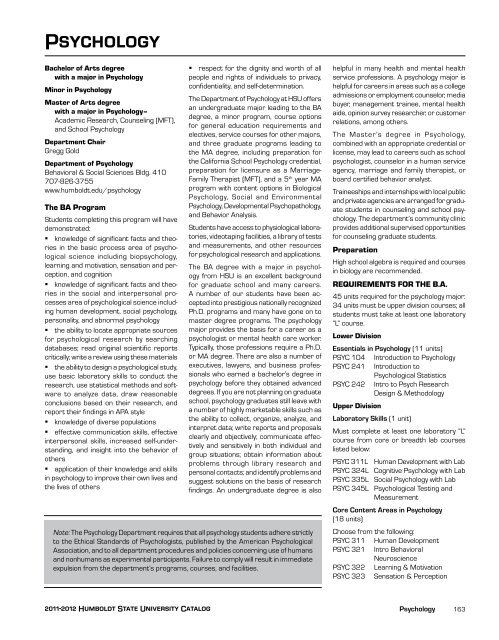2011-12 Academic Year - Bad Request - Humboldt State University
2011-12 Academic Year - Bad Request - Humboldt State University
2011-12 Academic Year - Bad Request - Humboldt State University
Create successful ePaper yourself
Turn your PDF publications into a flip-book with our unique Google optimized e-Paper software.
Psychology<br />
Bachelor of Arts degree<br />
with a major in Psy chology<br />
Minor in Psychology<br />
Master of Arts degree<br />
with a major in Psy chology–<br />
<strong>Academic</strong> Research, Counseling (MFT),<br />
and School Psychology<br />
Department Chair<br />
Gregg Gold<br />
Department of Psychology<br />
Behavioral & Social Sciences Bldg. 410<br />
707-826-3755<br />
www.humboldt.edu/psychology<br />
The BA Program<br />
Students completing this program will have<br />
demonstrated:<br />
knowledge of significant facts and theories<br />
in the basic process area of psychological<br />
science including biopsychology,<br />
learning and motivation, sensation and perception,<br />
and cognition<br />
knowledge of significant facts and theories<br />
in the social and interpersonal processes<br />
area of psychological science including<br />
human development, social psychology,<br />
personality, and abnormal psychology<br />
the ability to locate appropriate sources<br />
for psychological research by searching<br />
databases; read original scientific reports<br />
critically; write a review using these materials<br />
the ability to design a psychological study,<br />
use basic laboratory skills to conduct the<br />
research, use statistical methods and software<br />
to analyze data, draw reasonable<br />
conclusions based on their research, and<br />
report their findings in APA style<br />
knowledge of diverse populations<br />
effective communication skills, effective<br />
interpersonal skills, increased self-understanding,<br />
and insight into the behavior of<br />
others<br />
application of their knowledge and skills<br />
in psychology to improve their own lives and<br />
the lives of others<br />
respect for the dignity and worth of all<br />
people and rights of individuals to privacy,<br />
confidentiality, and self-determination.<br />
The Department of Psychology at HSU offers<br />
an undergraduate major leading to the BA<br />
degree, a minor program, course options<br />
for general education requirements and<br />
electives, service courses for other majors,<br />
and three graduate programs leading to<br />
the MA degree, including preparation for<br />
the California School Psychology credential,<br />
preparation for licensure as a Marriage-<br />
Family Therapist (MFT), and a 5th year MA<br />
program with content options in Biological<br />
Psychology, Social and Environmental<br />
Psychology, Developmental Psychopathology,<br />
and Behavior Analysis.<br />
Students have access to physiological laboratories,<br />
videotaping facilities, a library of tests<br />
and measurements, and other resources<br />
for psychological research and applications.<br />
The BA degree with a major in psychology<br />
from HSU is an excellent background<br />
for graduate school and many careers.<br />
A number of our students have been accepted<br />
into prestigious nationally recognized<br />
Ph.D. programs and many have gone on to<br />
master degree programs. The psychology<br />
major provides the basis for a career as a<br />
psychologist or mental health care worker.<br />
Typically, those professions require a Ph.D.<br />
or MA degree. There are also a number of<br />
executives, lawyers, and business professionals<br />
who earned a bachelor’s degree in<br />
psychology before they obtained advanced<br />
degrees. If you are not planning on graduate<br />
school, psychology graduates still leave with<br />
a number of highly marketable skills such as<br />
the ability to collect, organize, analyze, and<br />
interpret data; write reports and proposals<br />
clearly and objectively; communicate effectively<br />
and sensitively in both individual and<br />
group situations; obtain information about<br />
problems through library research and<br />
personal contacts; and identify problems and<br />
suggest solutions on the basis of research<br />
findings. An undergraduate degree is also<br />
Note: The Psychology Department re quires that all psy chol ogy students adhere strictly<br />
to the Eth ical Stan dards of Psyc hol o gists, published by the American Psy cho log i cal<br />
Association, and to all de part ment procedures and policies con cern ing use of humans<br />
and non hu mans as ex peri men tal participants. Failure to comply will result in immedi ate<br />
expul sion from the de part ment’s pro grams, courses, and fa cil ities.<br />
helpful in many health and mental health<br />
service professions. A psychology major is<br />
helpful for careers in areas such as a college<br />
admissions or employment counselor, media<br />
buyer, management trainee, mental health<br />
aide, opinion survey researcher, or customer<br />
relations, among others.<br />
The Master’s degree in Psychology,<br />
combined with an appropriate credential or<br />
license, may lead to careers such as school<br />
psychologist, counselor in a human service<br />
agency, marriage and family therapist, or<br />
board certified behavior analyst.<br />
Traineeships and internships with local public<br />
and private agencies are arranged for graduate<br />
students in counseling and school psychology.<br />
The department’s community clinic<br />
provides additional supervised opportunities<br />
for counseling graduate students.<br />
Preparation<br />
High school algebra is required and cours es<br />
in bi ology are recommended.<br />
REQUIREMENTS FOR THE B.A.<br />
45 units required for the psychology major:<br />
34 units must be upper division courses; all<br />
students must take at least one laboratory<br />
“L” course.<br />
Lower Division<br />
Essentials in Psychology (11 units)<br />
PSYC 104 Introduction to Psychology<br />
PSYC 241 Introduction to<br />
Psychological Statistics<br />
PSYC 242 Intro to Psych Research<br />
Design & Methodology<br />
Upper Division<br />
Laboratory Skills (1 unit)<br />
Must complete at least one laboratory “L”<br />
course from core or breadth lab courses<br />
listed below:<br />
PSYC 311L Human Development with Lab<br />
PSYC 324L Cognitive Psychology with Lab<br />
PSYC 335L Social Psychology with Lab<br />
PSYC 345L Psychological Testing and<br />
Measurement<br />
Core Content Areas in Psychology<br />
(18 units)<br />
Choose from the following:<br />
PSYC 311 Human Development<br />
PSYC 321 Intro Behavioral<br />
Neuroscience<br />
PSYC 322 Learning & Motivation<br />
PSYC 323 Sensation & Perception<br />
<strong>2011</strong>-20<strong>12</strong> <strong>Humboldt</strong> <strong>State</strong> <strong>University</strong> Catalog Psychology<br />
163

















